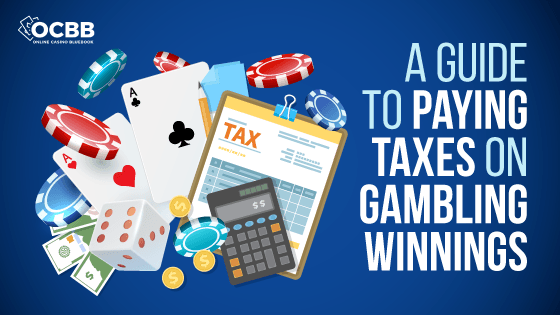
You’ve finally cashed out a long night of gambling. You’ve made a lot more money than you thought possible, and you had a blast doing so! Before you go out and celebrate, it’s essential to know how much of your winnings are going to be taxed. Tax laws surrounding gambling may be a bit confusing, but not paying your taxes and gambling against the US government will never give you favorable odds. Luckily, after reading this guide, paying your gambling taxes will be as easy as winning the money in the first place.
What You Need To Know For Gambling Taxes
Regardless of what type of player you are, there are specifics that are important to consider. when filing taxes on gambling..
What Is Taxable Gambling Income?
Almost all gambling income is taxable, which you are required by law to report on your federal income tax returns. Gambling winnings include, but are not limited to, money or prizes earned from:
- Casino games
- Slot machines
- Keno
- Poker tournaments
- Bingo
- Lotteries
- Sweepstakes
- Raffles
- Betting pools
- Gameshows
- Sports betting
- Horse or dog races
- Off-track betting
It is important to note that winnings over $5000 from the sources listed below are subject to income tax withholding:
Any wagering pool (including payments to winners of poker tournaments), sweepstakes, or lottery.
Any other wager (if the proceeds are at least 300 times the amount of the bet).
What Gambling Records Does The IRS Require?
You must keep track of your wins and losses that you’ve had at any physical or online casino. The United States, in particular, has iron-clad tax laws, and any amount of the money you make is subject to taxation.
You are required by the IRS to keep these details for each gambling win and loss:
- Date of the win/loss
- The type of gambling activity
- Address and name of the event or establishment
- Names of additional individuals there at the time of the activity
- Total amounts of winnings and losses
Can You Deduct Gambling Losses?
If you itemize deductions, you can deduct your losses on Schedule A as a miscellaneous, up to the amount of your total gambling winnings. Generally, your winnings and losses should be recorded separately, rather than a net amount. It’s important to note the losses are not subject to the 2% limit of your adjusted gross income.
Are Gambling Taxes Progressive?
You are only taxed 24% of your winnings, no matter the amount of money that you have won. Therefore this is excellent news for players who enjoy playing high-stakes poker or slots.
Furthermore, if you win big, casinos will often withhold 24% of your winnings when it is distributed. They will also supply you with a W2-G form, which is easy to fill out and used to report your winnings to the government. In these circumstances, filing your gambling taxes becomes very easy, as the casino will do half of the work for you.
What Type Of Gambler Are You?
It’s crucial to keep records of your gambling activities throughout your career, but how you pay your taxes differs depending on your gambler. Most general gamblers will be subject to the flat 24% rate, but professional, and non-resident players must also consider additional tax laws and dedicated tax forms.
Professional Players: Players whose gambling winnings are their primary source of income. This type of player is considered a self-employed individual. Professional players must report all winnings and losses and income on a Schedule C form (also known as Profit or Loss From Business Form 1040 or 1040-SR). Gambling losses are considered business expenses for professional players, so it’s essential to document all winnings and losses for tax return purposes.
Non-Resident Players: These are players that are not U.S. citizens or nationals but do the majority of their gaming in the U.S. Most commonly, these types of players can report winnings and losses via tax Forms 1040NR or 2020 Draft for 1040NR-EZ. It’s important to note that these forms cannot be e-Filed. Both the 1040NR and 1040NT-EZ Forms must be mailed in to the IRS. Generally, all these types of winnings are subject to a 30% flat tax. Not all losses can be deducted on this form. However, players from Canada can deduct the number of their winnings from their losses. This is due to a special tax treaty that the U.S. and Canada agreed upon.
You may be tempted to call yourself a professional gambler. But, be sure to stick to the definitions outlined in this guide. Putting yourself in an incorrect gambling category can lead to higher taxes, missing out on bigger tax refunds and/or breaking the laws!
Conclusion
Whether you’ve made a fortune playing online poker or you’ve doubled your money playing roulette, you now have the knowledge necessary to file your taxes correctly. As with all taxes, we always recommend that you consult a professional if you have any questions or concerns. We wish you the best of luck and remember to gamble responsibly!

